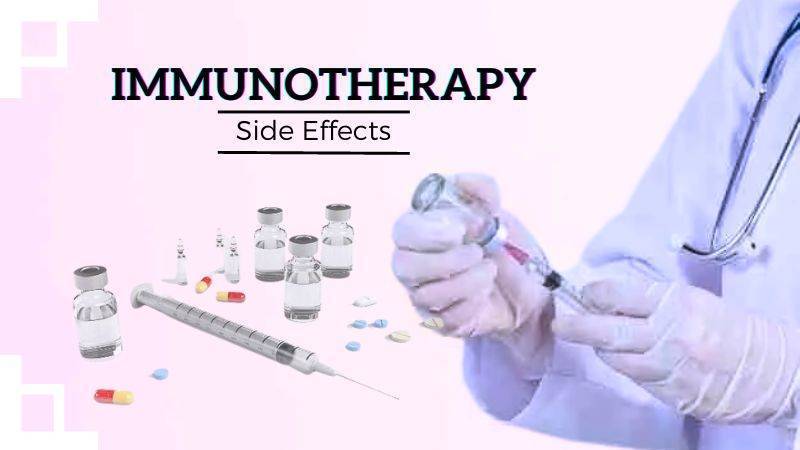Immunotherapy | Promising Benefits | Side Effects | How to Manage | Nutshell | FAQs |
In recent years, the field of cancer treatment has witnessed a groundbreaking advancement known as immunotherapy.
This innovative approach has shown remarkable success in improving patient outcomes and transforming the oncology landscape.
By controlling the power of the immune system, immunotherapy has revolutionized the way we combat cancer.
However, like any medical intervention, it is essential to be aware of the potential side effects associated with this treatment.
In this blog, we will delve into the world of immunotherapy and explore its side effects based on clinical research, shedding light on both the benefits and challenges of this promising therapy.
Understanding Immunotherapy

Immunotherapy, also referred to as biologic therapy, is a specialized form of cancer treatment that activates or enhances the body’s immune system to fight cancer cells more effectively.
Unlike traditional treatments like chemotherapy or radiation, which directly target cancer cells, immunotherapy helps the immune system recognize and attack cancer cells, effectively training it to become more vigilant against cancer’s growth and spread.
Promising Benefits of Immunotherapy

Immunotherapy has demonstrated remarkable success in various types of cancer, leading to long-term remission and even cures in some cases.
Its ability to stimulate the immune system’s response against cancer cells offers a unique advantage over traditional treatments.
Moreover, immunotherapy has shown efficacy across different cancer types, including melanoma, lung cancer, lymphoma, and others.
It has undoubtedly brought hope and optimism to patients and their families worldwide.
Unraveling the Side Effects

While immunotherapy has shown tremendous promise, it is crucial to acknowledge that it may also lead to side effects.
These complications can vary depending on the type of immunotherapy, the individual patient, and the specific cancer being treated.
Let’s explore some common side effects observed in clinical research:
- Fatigue: Fatigue is a widespread complication experienced by many patients undergoing immunotherapy. It can range from mild tiredness to severe exhaustion and may impact daily activities. However, it is usually temporary and resolves after treatment completion.
- Skin Reactions: Immunotherapy can lead to various skin reactions, including rash, itching, and blistering. These dermatologic effects are generally manageable with topical treatments and medical interventions.
- Gastrointestinal Issues: Some patients may experience digestive system problems such as diarrhea, nausea, vomiting, or loss of appetite. These complications can usually be controlled through medications or dietary modifications.
- Immune-related Adverse Events: Since immunotherapy activates the immune system, it can occasionally lead to immune-related adverse events, commonly known as immune-related adverse events (irAEs). These can affect various organs and systems in the body, including the lungs, liver, thyroid, and others. Prompt identification and management of these irAEs are crucial to ensure patient safety.
- Flu-like Symptoms: Patients undergoing immunotherapy may occasionally experience flu-like symptoms such as fever, chills, muscle aches, and headache. These symptoms are typically temporary and tend to improve with time.
It is important to note that not all patients will experience these complications, and the severity can vary.
Healthcare providers closely monitor patients undergoing immunotherapy to ensure early detection and effective management of any potential side effects.
Managing Side Effects
- Effective management of immunotherapy side effects requires close communication with your healthcare team.
- They will provide guidance on recognizing and reporting any changes in your health.
- In some cases, medications may be prescribed to alleviate specific side effects, while in others, temporary interruptions or adjustments to the treatment may be necessary.
- Open and honest communication with your healthcare provider is vital to ensuring your safety and well-being throughout the course of immunotherapy.
In a Nutshell
Immunotherapy has revolutionized cancer treatment, offering new hope for patients battling this complex disease.
The remarkable successes achieved through immunotherapy have solidified its position as a valuable therapeutic option.
However, it is crucial to recognize and understand the potential side effects associated with this treatment.
By educating patients, caregivers, and healthcare professionals about the possible side effects, we can ensure a more informed and vigilant approach towards immunotherapy.
FAQ
Q1: What causes the side effects of immunotherapy?
A1: The side effects of immunotherapy occur because the treatment activates the immune system, which can mistakenly attack healthy cells and tissues in addition to cancer cells.
Q2: What are the most common side effects of immunotherapy?
A3: Common side effects include fatigue, skin reactions (such as rash and itching), gastrointestinal issues (diarrhea, nausea), flu-like symptoms (fever, chills, muscle aches), and fluid retention/swelling.
Q3: Are immunotherapy side effects long-lasting?
A4: Side effects are typically temporary and will resolve after the completion of treatment. However, the duration and severity of side effects can vary from person to person.
Q4: How can I manage skin reactions from immunotherapy?
A5: Skin reactions can often be managed with topical treatments, such as creams or ointments recommended by your healthcare provider. It is important to keep the affected area clean and moisturized.
Q5: What should I do if I experience severe side effects?
A6: If you experience severe or concerning side effects, it is crucial to contact your healthcare provider immediately. They will evaluate your symptoms and determine the appropriate course of action, which may include adjusting the treatment or prescribing medications.
Q6: How can I alleviate fatigue caused by immunotherapy?
A8: Fatigue is a common side effect, but it can be managed through self-care practices such as getting enough rest, engaging in light physical activity, and eating a balanced diet. It is important to listen to your body and pace yourself.
Q7: Can immunotherapy affect organs other than the targeted cancer site?
A9: In some cases, immunotherapy can cause immune-related adverse events (irAEs) that affect organs such as the lungs, liver, thyroid, or others. Regular monitoring by your healthcare provider helps detect and manage these potential complications.






